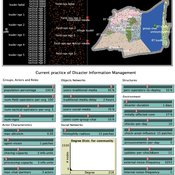
Vittorio Nespeca
AffiliationsDelft University of Technology
Personal homepagehttps://www.linkedin.com/in/vittorionespeca/
ORCID more infohttps://orcid.org/0000-0002-1691-0143
GitHub more infoNo bio entered.
Research Interests
- Crisis resilience
- Crisis & disaster response
- Information management
- Collective Intelligence
- Rigorous development of empirically-embedded ABMs, SDMs, and multi-models
- Model-based policy support
- Participatory multi-modeling
Peer reviewed Share: bottom-up disaster information management
Vittorio Nespeca Tina Comes Frances Brazier | Published Monday, December 05, 2022This model is intended to study the way information is collectively managed (i.e. shared, collected, processed, and stored) in a system and how it performs during a crisis or disaster. Performance is assessed in terms of the system’s ability to provide the information needed to the actors who need it when they need it. There are two main types of actors in the simulation, namely communities and professional responders. Their ability to exchange information is crucial to improve the system’s performance as each of them has direct access to only part of the information they need.
In a nutshell, the following occurs during a simulation. Due to a disaster, a series of randomly occurring disruptive events takes place. The actors in the simulation need to keep track of such events. Specifically, each event generates information needs for the different actors, which increases the information gaps (i.e. the “piles” of unaddressed information needs). In order to reduce the information gaps, the actors need to “discover” the pieces of information they need. The desired behavior or performance of the system is to keep the information gaps as low as possible, which is to address as many information needs as possible as they occur.
Under development.
